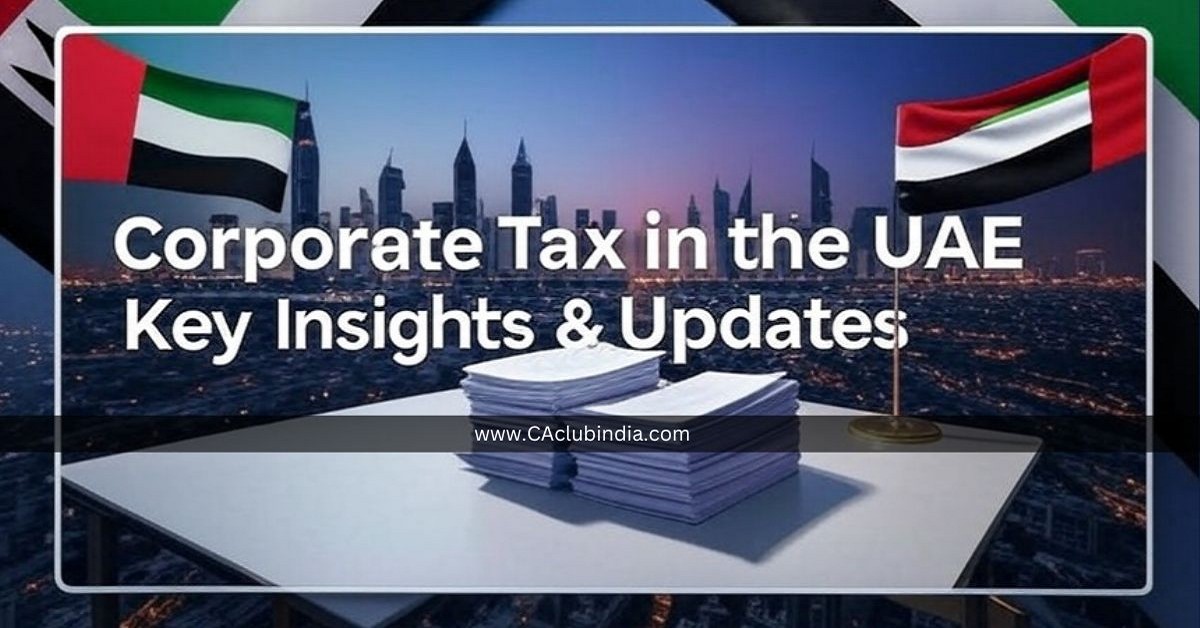Corporate tax is a direct tax imposed on the net income or profits of corporations and similar entities derived from their business activities. The regulations governing corporate tax are outlined in Federal Decree-Law No. 60 of 2023, which amends certain provisions of Federal Decree-Law No. 47 of 2022 concerning the taxation of corporations and businesses.
Companies in the UAE will be liable for Corporate Tax starting from the first day of their financial year beginning on or after June 1, 2023.

Applicability of Corporate Tax in UAE
- All businesses and individuals operating under a UAE commercial licence.
- Free zone businesses, provided they comply with regulatory requirements and do not conduct mainland UAE business activities (existing tax incentives for qualifying free zone entities remain applicable).
- Foreign entities and individuals regularly or continuously conducting business in the UAE.
- Banking operations.
- Real estate-related businesses, including management, construction, development, agency, and brokerage activities.
Entities Exempt from Corporate Tax
Government & Government-Controlled Entities
Generally exempt unless conducting licensed business activities, which may be taxable.
Extractive & Non-Extractive Natural Resource Businesses
Remain subject to Emirate-level taxation instead of federal Corporate Tax.
Qualifying Public Benefit Entities
Exempt if engaged in religious, charitable, scientific, educational, healthcare, environmental, or humanitarian activities, provided:
- No unrelated business income.
- No profit or asset distribution to owners/founders.
Qualifying Investment Funds
Exempt if meeting criteria such as:
- Regulatory supervision.
- Trading on recognized exchanges.
- Not established for tax avoidance.
Pension & Social Security Funds
Public/private funds exempt if regulated and meeting prescribed conditions.
Wholly-Owned UAE Subsidiaries of Exempt Entities
Exempt if fulfilling regulatory requirements.
Dividends & Capital Gains
Exempt for UAE taxpayers from qualifying shareholdings (if ownership/holding period criteria met and foreign entity taxed at ≥ 9%).
Natural Persons (Individuals)
Salary, personal investments, and real estate income are exempt unless:
- Business activity requires a commercial license and exceeds AED 1 million in annual turnover.
Qualifying Intra-Group Transactions & Reorganizations
Exempt if complying with specified conditions.
Foreign Permanent Establishment (PE) Exemption
Resident entities can elect for exemption on foreign PE income if taxed at ≥ 9% abroad.
UAE Corporate Tax Compliance Requirements
Registration
- Mandatory for all taxable persons with the Federal Tax Authority (FTA) to obtain a Tax Registration Number (TRN).
- Some exempt entities may also need to register.
Tax Period
Typically aligns with the financial year (Gregorian calendar or any approved 12-month period).
Filing & Payment Deadlines
Annual return must be filed electronically within 9 months after the tax period ends.
- Example: For FY ending 31-Dec-2024, the deadline is 30-Sep-2025.
Tax payment (if applicable) is due by the same deadline.
Filing Platform
Returns must be submitted via the FTA's EmaraTax portal.
Mandatory Filing
Required for all taxable persons, including:
- Entities with zero taxable income.
- Qualifying Free Zone Persons (even at 0% rate).
Financial Statements
Must comply with IFRS standards.
Audit required if:
- Revenue exceeds AED 50 million, or
- Entity is a Qualifying Free Zone Person.
Cash basis accounting may be allowed for small businesses (with FTA approval).
Record Keeping
Maintain all tax-related records for 7 years post-tax period.
Transfer Pricing (TP) Compliance
Follow OECD TP Rules, including:
- Master File & Local File documentation.
- Country-by-Country Reporting (CbCR) if group revenue exceeds €750 million.
Penalties
Late filing, errors, or non-compliance may result in substantial fines.
UAE Corporate Tax Rates
0% Tax Rate
Applies to taxable income up to AED 375,000 for resident businesses (supporting SMEs)
For Qualifying Free Zone Persons (QFZPs) on qualifying income, subject to:
- Maintaining adequate substance
- Earning qualifying income
- Not electing standard rates
- Complying with transfer pricing rules
For businesses under Small Business Relief (revenue ≤ AED 3 million) until 31 December 2026.
9% Tax Rate
- Applies to taxable income above AED 375,000 for resident businesses
- Applies to non-qualifying income of QFZPs
15% Domestic Minimum Top-up Tax (DMTT)
- Effective from 1 January 2025 for Multinational Enterprises (MNEs) with:
- ≥ €750 million (≈AED 3.15 billion) global revenue in 2 of last 4 years
- Ensures MNEs pay minimum 15% effective tax rate in UAE
- Implements OECD Pillar Two global tax standards
Deductions & Allowable Expenses
- Standard business expenses (salaries, rent, marketing, etc.).
- Interest deductions capped at 30% of EBITDA (with exceptions).
- Capital allowances (depreciation on assets).
- Loss relief (can carry forward losses indefinitely, offset against future profits).
Penalties for Non-Compliance
- Late registration: AED 10,000.
- Late return filing: AED 500–20,000.
- Underpayment: 14% annual interest on unpaid tax.
Conclusion
The UAE's corporate tax system strikes a careful balance between maintaining the nation's business-friendly environment and meeting international tax standards. The tiered tax structure - featuring a 0% rate for qualifying small businesses and a competitive 9% standard rate - demonstrates this equilibrium, supporting domestic growth while addressing global tax initiatives such as the OECD's Pillar Two framework.
This thoughtfully designed tax framework enhances the UAE's appeal as a premier international business destination while implementing transparent and responsible fiscal policies. Businesses operating in the UAE should maintain vigilance regarding evolving regulations and consider professional guidance to ensure optimal tax efficiency within the legal framework. The system's careful construction reinforces the nation's strategic position as a global commerce and investment leader.










 CAclubindia
CAclubindia
